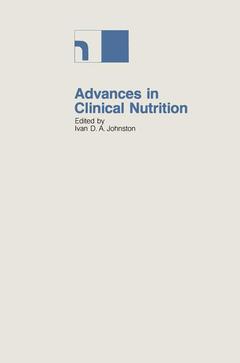Advances in Clinical Nutrition, 1983 Proceedings of the 2nd International Symposium held in Bermuda, 16–20th May 1982
Langue : Anglais
Coordonnateur : Johnston I.D.A.

The advent of any new and effective therapy is soon followed by large numbers of publications in which the indications and benefits are explored critically. It is not unexpected, therefore, that within five years of the first Bermuda Symposium on advances in parenteral nutrition that a second Symposium was considered appropriate to review progress and explore new areas of investigation, as well as enlarging the scope of the meeting to include enteral nutrition. The rate of progress can be judged by the number of subjects which were not discussed at the first Symposium. For example, home parenteral nutrition, computer assisted assessment and prescribing, Studies of body protein synthesis and breakdown and the role of branched-chain amino acids are all new subjects for this Symposium which were not covered at all in the first meeting. Much progress has also been made to our understanding of the biochemi cal complications of parenteral nutrition and the problems related to long term access to the circulation. Nutritional care has become safer and more effective. There is an increasing awareness of the difficulties in making a true nutritional assessment in selecting patients for total parenteral nutrition and more attention has also been focussed on different approaches to enteral support in the management of undernourished patients. There is also continuing debate on the cost effectiveness of this expensive method of treatment and critics look in vain for evidence of efficacy based on controlled trials in specific groups of patients.
Section 1 Branched-Chain Amino Acids.- 1. Branched-chain amino acids: metabolic roles and clinical applications.- 2. Intracellular and plasma branched-chain amino acid interrelationships.- 3. Branched-chain amino acid supplementation in the injured rat model.- 4. Review of branched-chain amino acid supplementation in trauma.- 5. The importance of study design to the demonstration of efficacy with branched-chain amino acid enriched solutions.- 6. Branched-chain amino acids in surgically stressed patients.- 7. Selective nutritional support for hepatic regeneration: experimental and clinical experiences with branched-chain amino acids.- 8. The effect of branched-chain amino acids on body protein breakdown and synthesis in patients with chronic liver disease.- Section 2 Nutritional Support in Renal Failure.- 9. Nutritional therapy for patients with acute renal failure.- 10. Can low protein diet retard the progression of chronic renal failure?.- 11. Experience with prolonged intradialysis hyperalimentation in catabolic chronic dialysis patients.- Section 3 Special Care Enteral Feedings.- 12. Enteral feeding in liver failure.- 13. Nutritional support in the thermally injured patient.- 14. Breast milk in neonatal care.- Section 4 Current Perspectives in the Use of Lipid Emulsion.- 15. Intravenous fat emulsions: a neonatologist’s point of view.- 16. Clinical applications of 20% fat emulsions.- 17. Changes in binding of bilirubin due to intravenous lipid nutrition.- 18. Clinical experience with fat-containing TPN solutions.- 19. The stability of fat emulsions for intravenous administration.- 20. The stability and comparative clearance of TPN mixtures with lipid.- 21. Problems and prospects in lipid metabolism during parenteral nutrition.- Section 5 Energy Requirements inStressed Patients.- 22. Alterations in fuel metabolism in stress.- 23. The carbohydrate content of parenteral nutrition.- 24. Fat utilization in critically ill patients.- 25. Liver malfunction associated with parenteral nutrition.- Section 6 Some New Concepts in Clinical Nutrition.- 26. Role of carnitine supplementation in clinical nutrition.- 27. Experience with alternative fuels.- 28. Topical nutrition — a preliminary report.- 29. Nutritional and immunological parameters for identification of the high risk patient.- Section 7 Home Parenteral Nutrition.- 30. Intestinal failure and its treatment by home parenteral nutrition.- 31. Implementation of a home nutritional support programme.- 32. Techniques of longterm venous access.- 33. Home parenteral nutrition.- 34. Quality of life for the home-care patient.- 35. Experience with ambulatory total parenteral nutrition in Crohn’s disease.- 36. Preliminary report on collaborative study for home parenteral nutrition patients.- Section 8 Conclusion.- 37. Future directions.- 38. Thoughts for the future of clinical nutrition.- 39. Concluding remarks to the symposium on clinical nutrition.
Date de parution : 02-2012
Ouvrage de 483 p.
15.5x23.5 cm
Thème d’Advances in Clinical Nutrition :
Mots-clés :
© 2024 LAVOISIER S.A.S.



